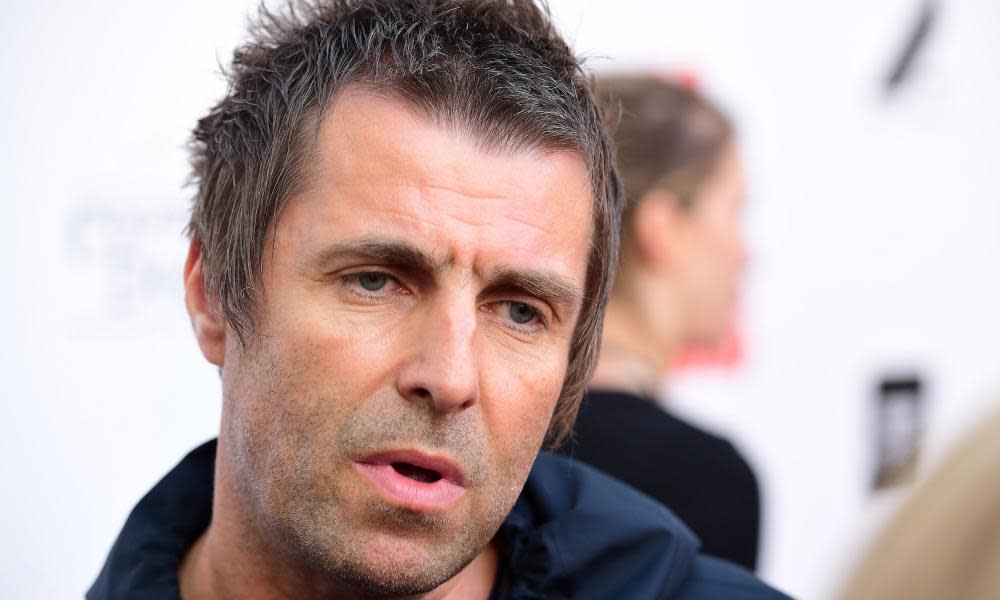Liam Gallagher challenges Sadiq Khan over rise in knife crime

Liam Gallagher has criticised London’s mayor, Sadiq Khan, over rising knife crime in the capital and expressed his fears for the safety of his children.
The former Oasis singer, 46, said: “Every time you wake up in the morning, there’s some 16-year-old kid been knifed to death. I’ve got kids that age, out and about and that, doing their thing, living, being young. That freaks me right out – it does worry me. I’ve got teenagers.”
Gallagher, who lives in north London, has four children, including his sons Gene, 17, and Lennon, 19. He also has two daughters – Molly, 22, and six-year-old Gemma.
He singled out Khan for apparent inaction in the knife-crime crisis on BBC Breakfast on Monday.
He said: “I’d have a word with that mayor – he seems to not be doing a good job, all them kids getting knifed and all that. The only thing that ever comes out of his mouth is, ‘London is open.’ What, open for knife crime and dying and stuff?”
The killings last weekend of four people within four days in London put knife crime in the capital in the international spotlight, with Donald Trump also criticising Khan over his handling of the issue.
What is the scale of the problem?
Police chiefs have described the recent spate of knife crime as ‘a national emergency’. In the first two months of 2019 there were 17 homicides in London alone, where 35% of all knife crimes are committed.
The number of NHS England admissions among people aged 10-19 with knife wounds has risen 60% in five years, surpassing 1,000 last year.
The number of knife and offensive weapon offences in England and Wales have risen to their highest level for nearly a decade, with the number of cases dealt with by the criminal justice system up by more than a third since 2015.
Figures on sentences handed out for such crimes, published by the Ministry of Justice, showed there were 22,041 knife and weapon offences formally dealt with by the criminal justice system in the year ending March 2019. This is the highest rate since 2010, when the number was 23,667.
What happens to people caught with knives?
In the year ending March 2019, 37% of knife and offensive weapon offences resulted in an immediate custodial sentence, compared with 22% in 2009, when the data was first published. The average length of the custodial sentences rose to the longest in a decade, from 5.5 months to 8.1 months.
Are younger people more at risk of being involved in knife crime?
The MoJ figures revealed that the number of juvenile offenders convicted or cautioned for possession or threats using a knife or offensive weapon increased by almost half (48%) between the year ending March 2015 and the year ending March 2019.
The increase in adult offenders over the same period was smaller, at 31%. However, adult offenders still accounted for 74% of the total increase in cautions and convictions received for those offences in that period.
What are the government doing about knife crime?
In March 2019 chancellor, Philip Hammond, handed an extra £100m to police forces in England and Wales after a spate of fatal stabbings led to a renewed focus on rising knife crime and police resources.
In the same month more than 10,000 knives were seized and 1,372 suspects arrested during a week-long national knife crime crackdown. Officers carried out 3,771 weapons searches, during which 342 knives were found. Another 10,215 were handed in as part of amnesties.
A new Offensive Weapons Act was passed in May 2019, making it illegal to possess dangerous weapons including knuckledusters, zombie knives and death star knives. It also made it a criminal offence to dispatch bladed products sold online without verifying the buyer is over 18.
Related: Church of England urged to offer haven from knife crime
Gallagher, who last week claimed he would make a good prime minister because he has previously “dabbled in drugs”, also condemned politicians who use drugs.
“I don’t hang out with politicians and I don’t hang out with celebrities that hang out with politicians or these fake rock’n’roll stars that hang out with politicians,” he said.
“I just hang out with me and my missus and my kids, and my mates. But if I did see a politician taking drugs, man, he’d get a crack round the head.”
He added: “They shouldn’t be … they’re meant to be running the country, aren’t they?”
During the Conservative leadership race, the former candidate Rory Stewart admitted to having once taken opium, while Michael Gove admitted to taking cocaine more than 20 years ago.

 Yahoo News
Yahoo News 
